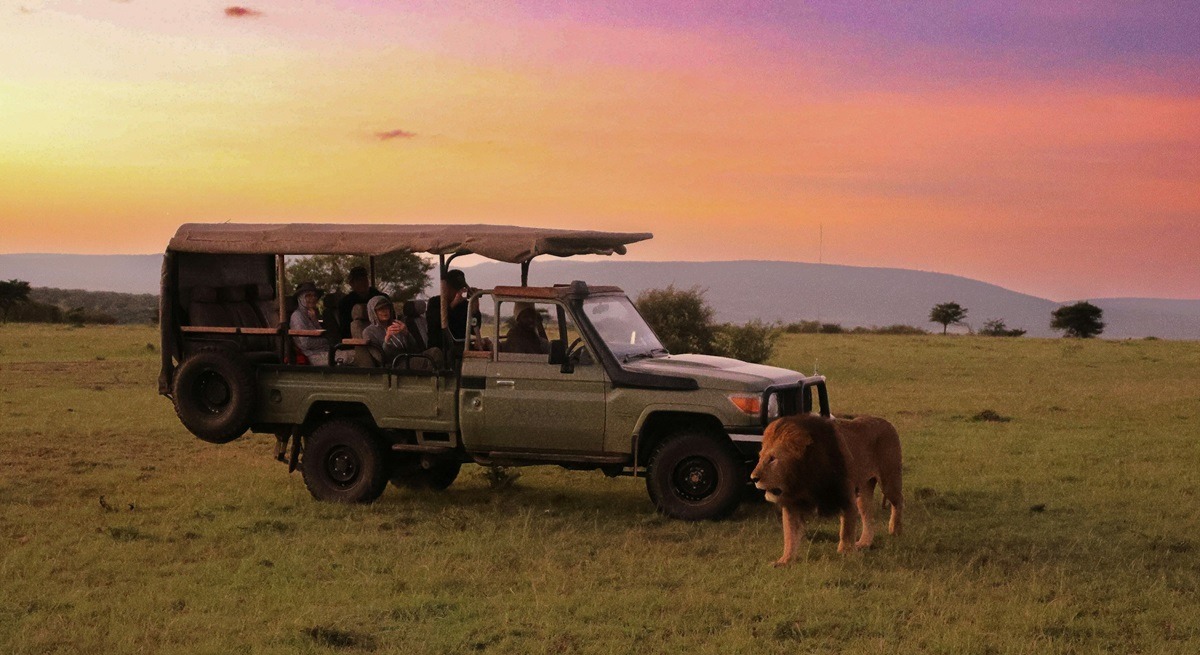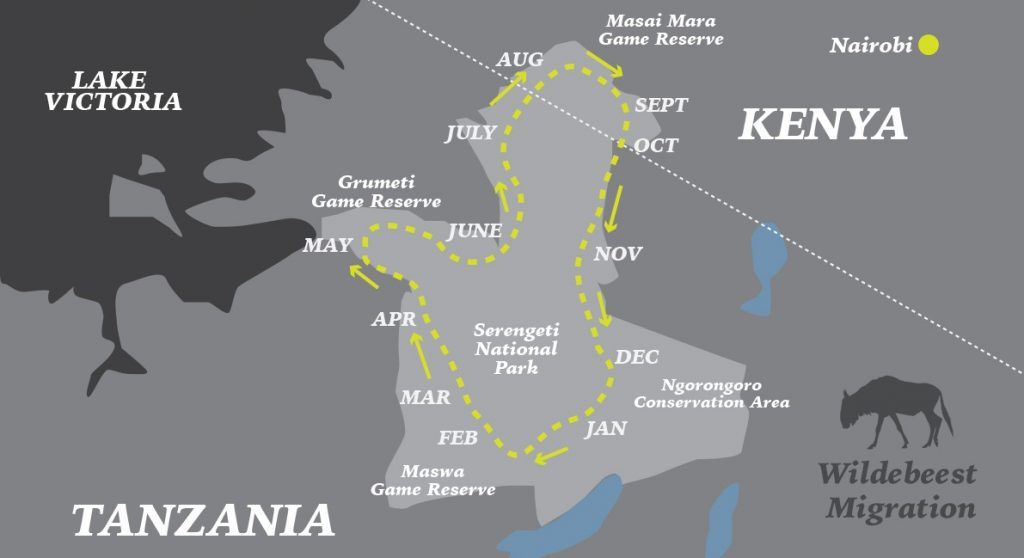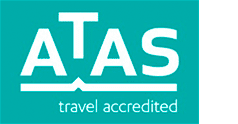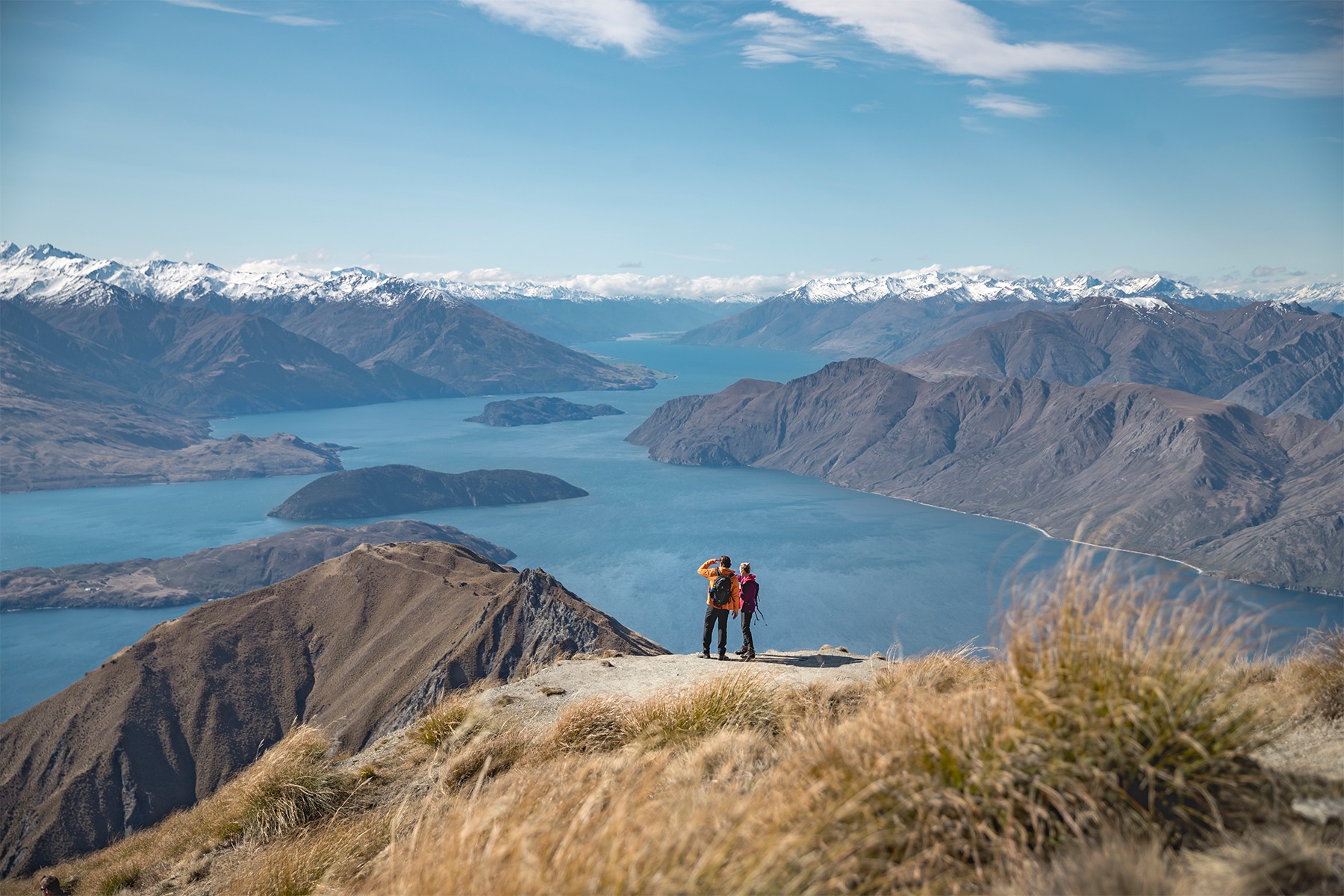
When is the best time to visit Africa?
Africa is the world’s second largest continent which means that weather conditions vary from one country to the next. Deciding on the perfect time to travel to Africa is often determined by your motivations for going there – where you want to visit, why you’re travelling and of course, your interests! Below is a list of the ideal times to travel to each region in Africa however, keep in mind that all areas can be visited year round.
| Country | When to Go |
| Botswana |
|
| Ethiopia |
|
| Kenya |
|
| Madagascar |
|
| Malawi |
|
| Mozambique |
|
| Namibia |
|
| Rwanda |
|
| South Africa |
|
| Tanzania |
|
| Uganda |
|
| Zambia |
|
| Zimbabwe |
|
When to go to see the Wildebeest Migration
The annual Wildebeest Migration is one of the last natural wonders left on earth and a must see on any East Africa safari. Over two million Wildebeest migrate from Tanzania’s Serengeti National Park to the Maasai Mara National Reserve in Kenya and predicting the movements of the large herds is not an exact science, as it is governed by the rainfall in certain areas.
The map and information below provide a rough guide on their movements:
December to March
In the early part of the year (December – March), they spread out throughout the Southern Plains of the Serengeti. This is the time that the southern plains are lush and green, which gives the newborns the strength for the long journey ahead. Things however, are not all cute and cuddly as predators lurk in the shadows…
May to August
From May to August the long trek towards the Masai Mara in Kenya is in full swing, with some of the herds following the traditional Western Corridor routing, which is where the fabled river crossings occurs at the Grumeti River. The big question of survival comes up at this point… will they survive the river? Others split off to follow a more north easterly direction.
August to November
From August to November the herds are generally located in the northern reaches of the Serengeti and in the Masai Mara and beyond. The Wildebeest are met with some more opportunities for river crossings on the Mara River, before the long return journey.
Flights to Africa
Eclipse Travel can assist you with all of your flight arrangements including international flights, round-the-world flights as well as internal Africa flights.
Which airlines fly to Africa from Australia?
If you are departing from the east coast of Australia you have the option of flying direct from Sydney to Johannesburg with Qantas. If you are departing from anywhere else in Australia, you must first fly to Perth then on to Johannesburg with South African Airways. Alternatively, you can fly into Africa by first flying into Asia or the Middle East with airlines such as Emirates, Etihad and Singapore Airlines. You can fly from most major cities in Asia and the Middle East to most major cities within Africa.
Can Africa be incorporated into round-the-world flights?
Yes, there are many options, some of which can be good value or if you are simply looking to combine Africa with Asia or the Middle East on the one ticket, there are other good alternatives our team would be more than happy to discuss with you.
What is the baggage allowance for flights?
Baggage allowance often depends on the airline and where you are flying to and from. Generally speaking, international flight allowance is between 20-23kgs, 7-8kgs for hand luggage and 15-23kgs for domestic flights.
Some popular airline baggage allowances can be found here:
Qantas | South African Airways | Emirates | Singapore Airlines | Kenya Airways | Air Madagascar
**Please note, if you are taking a charter flight, or if you are going on an ‘Overland Safari’ or ‘Fly-in Safari’, different baggage allowances may apply and you may be required to carry only a small soft-sided bag with you. Please check with your consultant if this applies to you.
Visas, Entrance Fees & Insurance required for Africa
See our Africa holiday guide here for a comprehensive overview of packing and tipping.
- EAST AFRICA TOURIST VISA: Kenya, Rwanda and Uganda
This visa allows multiple entries within the 3 countries, however it automatically expires if a traveller goes outside of these countries. You must apply for and pay online. The cost is US$101. There is no option to apply for the visa on arrival.
Apply through the diplomatic mission of the first of the two or three countries you intend to visit.
Kenya – Apply for your Kenya Electronic Travel Authorisation (eTA) here. Travellers with existing visas may continue to use those so long as they are valid and do not have to apply for the eTA. The eTA website has comprehensive information on what is needed to apply and all other details. Processing time is “generally 3 business days”. Travellers who have an East Africa Visa obtained from Uganda or Rwanda may use this visa to enter Kenya. Please remember that the visa becomes invalid if the travellers enter Tanzania which did not sign on to the agreement.
Uganda – Apply here. If you are only visiting Uganda you can apply for a single entry visa for US$50 through the same link.
Rwanda – Apply here (Click visa application under Immigration and Emigration). If you are only visiting Rwanda you can apply for a visa upon arrival for US$50.
- KAZA UNIVISA: Zimbabwe and Zambia
The KAZA UniVisa is a visa for foreigners visiting Zimbabwe and Zambia. It allows unlimited border crossings between the 2 countries and allows for day trips into neighbouring Botswana provided you return to Zambia or Zimbabwe the same day. The visa can be obtained on arrival into either Zimbabwe or Zambia. The cost is US$50.
| Zambia | Zimbabwe |
| Kenneth Kaunda International Airport | Harare International Airport |
| Harry Mwanga Nkumbula International Airport | Victoria Falls International Airport |
| Victoria Falls Border | Victoria Falls Border |
| Kazungula Border | Kazungula Border |
You can also apply for the KAZA UNIVISA online [e-Visa], only if you are arriving at Kenneth Kaunda International Airport, Harry Mwanga Nkumbula International Airport, Victoria Falls Border and Kazungula Border Control, on the Zambian side.
Zambia – Botswana (and vice versa)
· Zambian passengers will proceed from Zambia to Botswana on the bridge without stopping on the Zambian side.
· On the Botswana side, guests will be escorted from the car park to the Port Health facility for screening.
· The Zambian guide will not proceed beyond the screening point, and the Botswana guide will meet the passengers after the screening is complete.
· The Botswana guide will escort the passengers to the Zambian exit (customs and immigration), then on to Botswana entry (customs and immigration), after which they will transfer the passengers to their destination.
· Passengers entering Zambia from Botswana will proceed across the bridge to the Zambian side, without stopping on the Botswana side. Botswana exit formalities and Zambia entry formalities will be completed on the Zambian side.
· The Zambian guides will meet the passengers and escort passengers through the combined customs and immigration processes, and then transfer them to their destination
- Botswana
No tourist visa required for Australian, New Zealand or US citizens.
- Ethiopia
Visa required for all foreign passport holders. You must apply online ahead of time. It costs US$82 for a 30-day single-entry tourist visa.
- Lesotho
The Lesotho Tourism Authority has added an additional levy for all travellers entering Lesotho of R50 per person payable on entry to Lesotho from the 1st of April 2024.
- Madagascar
There is no visa required for visits between 1-15 days however you must pay an administration fee of US$10 or EUR10 upon arrival. For longer stays travellers require a visa. Apply online or obtain at arrival at Malagasy international airports for US$37 for a single-entry 30-day tourist visa.
- Malawi
Visa required for Australian, New Zealand and US citizens. Can be obtained on arrival or apply online. Visas cost US$50 for a 30-day single-entry tourist visa and US$ 50 for a transit visa.
- Mozambique
Visa required for Australian, New Zealand and US citizens. Can be obtained on arrival or apply online. US$50 for a 30-day single-entry tourist visa.
- Namibia
No tourist visa required for Australian, New Zealand or US citizens for 90 days or less.
- South Africa
No tourist visa required for Australian, New Zealand or US citizens visiting for 90 days or less. All travellers must complete the online declaration before arriving in South Africa. Details here.
- Tanzania
Visa required for Australian, New Zealand and US citizens. Can be obtained on arrival OR online ahead of time HERE.US$50 for a single-entry visa (except US Citizens who must pay US$100), US$30 for a transit visa.
What additional entrance fees or taxes can I expect?
If you are planning on entering any national parks of reserves during your time in Africa you can expect to pay an entrance fee. The amount can vary from park to park and the method of payment can also vary. We recommend carrying some USD with you as this is a commonly accepted form of payment.
Travel Insurance
We highly recommend purchasing comprehensive travel insurance when travelling to Africa. Please check the terms of your policy carefully, particularly with regard to limits of cover and ensure you are familiar with the procedure for making claims. Once you have paid your deposit or full payment, certain fees will apply if you have to cancel your holiday and for this reason you should take out insurance at the time of paying your deposit or full payment, which should then protect you in such a situation.
LGBTQIA+ Travellers
When it comes to LGBTQIA+ travellers visiting Africa, there are several risks and concerns that need to be considered. One of the primary concerns is the varying levels of acceptance and legal protections for LGBTQIA+ individuals across different African countries. While some countries have made progress towards LGBTQIA+ rights, many others still have laws that criminalize same-sex relationships or engage in discrimination based on sexual orientation or gender identity. This creates potential risks of harassment, discrimination, and even legal consequences for LGBTQIA+ travelers. Additionally, cultural attitudes and societal norms may be less accepting, which can lead to social stigmatization and potential safety issues.
In May 2023, despite international condemnation, the Ugandan government approved controversial new legislation outlawing LGBTQIA+ relationships and acts. The legislation imposes severe penalties, including lengthy prison sentences and even the death penalty in extreme circumstances. The legislation does not outlaw identifying as LGBTQIA+, rather the specific physical acts and ill-defined ‘promotion’ of LGBTQIA+ lifestyles. These laws apply to tourists as well as citizens. We encourage clients identifying as LGBTQIA+ to carefully consider the risks of travelling to Uganda.
Travelling with Children to South Africa
Previously, in an attempt to prevent child trafficking, South Africa required strict documentation for people wishing to travel with children. This requirement has now been lifted for foreign children, regardless of whether they are travelling with a single parent, both parents or a guardian.
See our Africa holiday guide for more information on travelling to South Africa with children.
Travelling with Children to Botswana
If you are travelling with children through Botswana Borders, please be aware that you will be required to have certified copies of their unabridged birth certificates, and passports on hand. Please make sure you have the following documents prior to travel for children under 18 years of age:
Travelling with both parents:
- Parents must produce a certified unabridged birth certificate and a valid passport.
Travelling with one parent:
- Parents must produce a certified unabridged birth certificate, a valid passport and a court order/ death certificate/ affidavit confirming the absent parent has given permission for the child to travel.
Travelling with someone other than a parent:
- Guardian must produce a certified unabridged birth certificate, a valid passport and an affidavit confirming the parents have given permission for the child to travel.
Children travelling unaccompanied:
- Child must produce a certified unabridged birth certificate, a valid passport and affidavit confirming permission to travel from both the parents or legal guardians, and letter from person who will receive child in the final destination including their full contact details and a certified copy of their passport or ID.
Health & Diet Considerations when Travelling to Africa
What vaccinations are required?
A range of factors need to be considered by both yourself and your health care professional when assessing the need for vaccines and/or medical when planning your trip to Africa. The following information should be used as a guide only and not a replacement for professional health advice. It is recommended that you visit a travel clinic at least 6-8 weeks before you travel to ensure that you are fit and well to travel. The following is a list of our general recommendations:
- Hepatitis A – recommended for all travellers
- Typhoid – recommended for all travellers
- Yellow Fever – highly recommended for all travellers. Most countries will not allow entry without a Yellow Fever Certificate.
- Malaria – recommended for all travellers
- Hepatitis B – recommended for all travellers
- Rabies – for travellers spending a lot of time outdoors, or doing activities where you are at a high risk of getting bitten by an animal, or if you will be doing an activity that brings you into direct contact with bats
- Tetanus, Pertussis & Diphtheria – a booster is recommended if you have already received these vaccinations
- Meningitis – recommended for all travellers
Dietary Requirements
Whilst we understand that no two people are the same therefore, no dietary requirements are the same and these can often be vital to your health. Sometimes due to cultural and language differences, these are not always easy to communicate when you are travelling. Eclipse Travel aims to alleviate these concerns and will assist with communicating any dietary requirements that you may have with our local suppliers in Africa. Please ensure that you inform your sales consultant of your dietary requirements well in advance to ensure the best chance of you getting the foods that you need.
Money Matters
Currency
We recommend using the local currency for each country throughout Africa as you will get the most value for your money. You will be able to access ATMs in most of the large cities and high end hotels but as soon as you leave the city, ATMs become scarce. As a backup we recommend carrying a supply of US dollar notes and/or the European Euro as these are widely accepted, in fact, many countries charge airport entry fees in US dollars and some national parks will only accept US dollars for their entry fees. If you are on a high end safari, it is quite common to tip using US dollars as well. Travel money cards are also an option for your African holiday as they work the same as a bank card. If you are planning to travel with a credit card then we highly suggest having a Visa card as it is the most widely accepted. Mastercard is accepted in most major cities however, you may have difficulty using it in smaller towns. Diners Club cards and American Express are not widely accepted therefore, we do not suggest relying on these cards.
Local currencies are as follows:
| Country | Currency |
| Botswana | Pula (BWP) |
| Ethiopia | Ethiopian birr (ETB) |
| Kenya | Kenyan shilling (KES) |
| Madagascar | Malagasy ariary (MGA) |
| Malawi | Malawian kwacha (MWK) |
| Mozambique | New Mozambican metical (MZN) |
| Namibia | Namibian dollar (NAD) |
| Rwanda | Rwandan franc (RWF) |
| Tanzania | Tanzanian shilling (TZS) |
| Uganda | Ugandan shilling (UGX) |
| Zambia | Zambian kwacha (ZMK) |
| Zimbabwe | American dollar (USD) |
Tipping Guidelines
Tipping in Africa isn’t a standard like it is in the United States but it is encouraged as for most people that you will come across, porters, safari guides and drivers, tips make up a significant percentage of their salary. It is handy to keep a few small bills on you at all times for tips and we recommend that they be either US dollar bills or the local currency. Expected amounts differ in each country and often depend on who it is that you are tipping. As a broad guideline, we recommend tipping the following: (USD amounts)
- 10% of the total bill for good food and service at a restaurant or bar
- $1-$2 for transfer drivers to/from airports and hotels
- $1 per bag for porters
- $3-$5 per day for personal butlers, trackers (if separate to guide), and tour drivers (if separate to guide)
- $10 per day for professional guides remaining with you for the length of your stay at a safari camp or the length of an overland safari tour (given as a lump sum when you say goodbye)
- $5 per day for staff at a safari camp (given as a lump sum in the communal tip box when you say goodbye)
- $10 per day for a guide on a standalone full-day excursion/activity
- $5 per day for a guide on a standalone half-day excursion/activity
Technology
Internet Access
Most hotels we use in Africa offer WiFi. When on safari, you may have internet access included in your stay but please note, it is not always reliable.
Telephone Calls
When travelling, it is always best to turn your global roaming off as this can result in a large surprise when you get your next phone bill. We recommend downloading programs such as Skype and Whatsapp before departing to make free calls to your family and friends using the Wi-Fi in your hotel. Additionally, you may consider downloading an Airalo E-sim, giving you access to data and/or calls on your own mobile phone at low cost rates.
Electrical Outlets in Africa
Electrical outlets throughout Africa vary from country to country but will generally be 240 volts. Visit this link for more information on each country.
Packing Lists
IMPORTANT INFORMATION
- Tanzania
As of the 1st June 2019, Tanzania banned all single use plastics including plastic bags, garbage bags, shopping bags, carrier bags and zip-lock bags which are often used to store liquids, cosmetics etc. when travelling. Please ensure that you dispose of any plastic bags prior to boarding your vehicle taking you to Tanzania otherwise you may face fines upon arrival. - Kenya
The Kenyan government’s environmental law have implemented plastic bag ban, so please refrain from using any and all forms of ‘disposable’ plastic carry bags. This would include plastic being found in both the main luggage as well as hand luggage to prevent any inconveniences on arrival into Kenya. In addition, please kindly note that when you purchase duty free goods before entering Kenya, you will be required to leave the duty free plastic carry bags at the port of entry.
SUGGESTED PACKING LIST: GENERAL
- Passport
- Visas
- Travel insurance documents
- Itinerary and tickets
- Cash
- Credit card / travel card
- Photocopies of important documents – keep in your suitcase and an electronic copy on your email
- Health documentation / vaccination cards
- Suitcase or backpack – most of our tours don’t require a backpack but ask if you are unsure.
- Day pack
- Toiletries
- Sunscreen
- Lip balm
- Insect repellent
- Medications (if required)
- First aid kit
- Clothes – jacket for colder destinations, jumper, dress, shirts, t-shirts, long pants, socks, underwear, rain jacket, swimmers, hat, smart casual clothes if you are planning on eating at some nice restaurants
- Comfortable shoes with good grip and sandals or flip flops
- Sunglasses
- Telephone
- Camera and charger
- Laptop/tablet and charger
- Converter / adapter
SUGGESTED PACKING LIST: SAFARI
- Sturdy shoes or boots for hiking
- Lightweight, moisture wicking, easy care clothing in neutral colours. Avoid brightly coloured and white clothing
- Comfortable short and long sleeved shirts
- Comfortable shorts and long trousers
- Rain jacket
- Enough pairs of underwear for the duration of your safari
- Pyjamas
- Swimming costume
- Flip flops or sport sandals
- Enough pairs of socks for the duration of your safari
- Insect repellent
- Sunscreen
- Quick dry travel towel
- Malaria tablets
- Personal toiletries
- Sunglasses
- Wet wipes/hand sanitiser
- Lip balm
- Any prescribed medicines
- Day pack
- Soft sided bags may be needed for chartered flights instead of suitcases. Please ask your consultant if you are unsure
- Safari binoculars
- Flashlight or head torch
- First aid kit
- Thermals, beanie, gloves – during winter temperatures can drop dramatically especially in the early morning and late evening.
On both private trips incorporating light aircraft flights and small group overland tours baggage is usually restricted to 15kgs per person, in soft-sided bags only (duffel bags preferred). Hard shell suitcases are not acceptable as they often cannot fit in the luggage compartments of light aircraft planes and safari trucks. These restrictions are designed for your safety and comfort, and it is important they are adhered to. Some light aircraft flights in Botswana allow 20kgs so check with your consultant if you are doing a private safari in Botswana.




